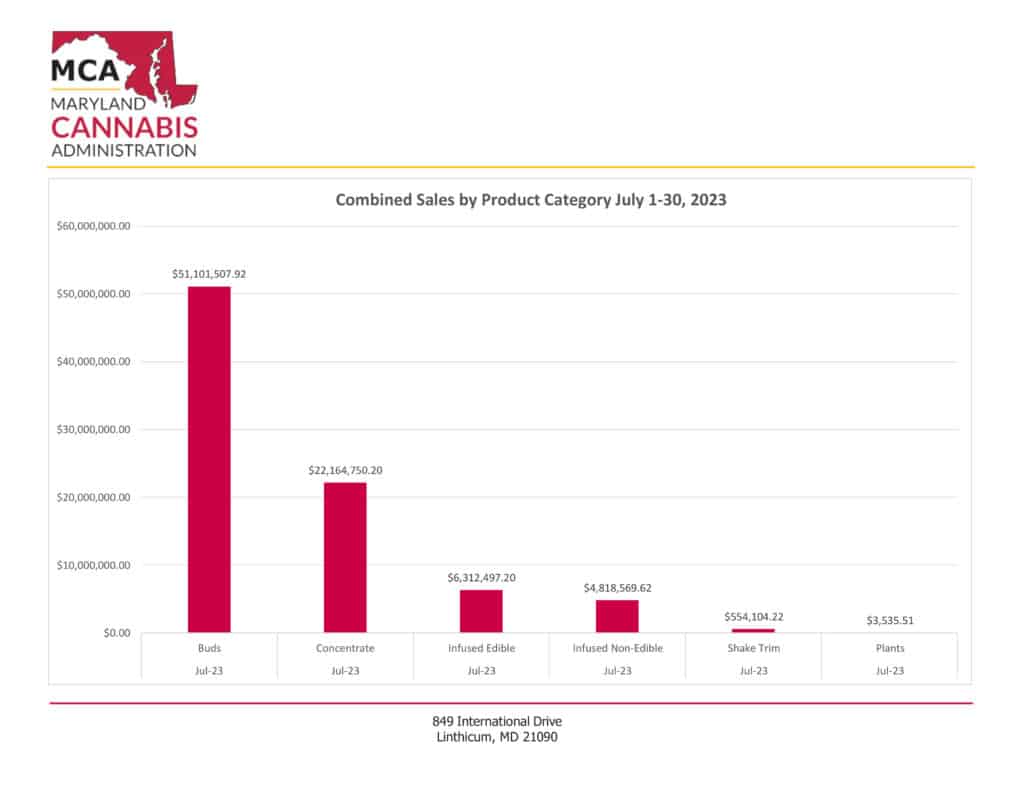Maryland’s first month of adult-use marijuana sales has been nothing short of remarkable. The state sold over $87 million in cannabis products, with flower being the most popular product category. This successful launch was mainly due to how well-prepared Maryland was to roll out their new adult-use market.
The Marijuana Policy Project noted that Maryland officials “worked diligently to develop a comprehensive and thoughtful regulatory structure” that assured the successful launch of adult-use cannabis sales.
The Numbers: How Much Did Maryland Sell and What Products Were Most Popular?
In Maryland’s first month of adult-use sales, over $87 million in products were sold. The most popular product category was flower, with almost 60% of overall sales coming from this form. Other popular product categories included pre-rolls and concentrates, which combined made up more than a quarter of total sales.

The high demand for flower-based products was unexpected to many, given that edibles and beverages are usually the top sellers in other adult-use states. This indicates just how unique Maryland’s market is—and how different strategies might need to be implemented for product sales and marketing within the state.
It is also worth noting that while flower was the most popular product category, it was the least profitable. Pre-rolls and concentrates had much higher average prices than flower, which likely indicates a shift in consumer preferences towards more value-based products.
How Did Maryland Prepare for the Roll-Out of Adult-Use?
The successful launch of Maryland’s adult-use market can largely be attributed to the groundwork that was laid ahead of time. In 2018, before voters approved a ballot measure legalizing adult-use cannabis, legislators formed a work group of stakeholders from all across the industry.
This workgroup identified critical issues for the state to address, such as social equity and public safety.
The workgroup also recommended that Maryland create an Office of Social Equity (OSE). This office was tasked with developing strategies to ensure that those most impacted by the war on drugs have access to the economic opportunities presented by legalization.
The OSE has been successful in its efforts thus far, as evidenced by the number of social equity applicants that have been granted licenses. This demonstrates how important it is to create a structure for these types of initiatives ahead of time—otherwise, they may not be possible in the future.
Strategies for Building Equity In the Market
In addition to creating the Office of Social Equity, Maryland has implemented several strategies for building equity in the market. These included collecting licensing conversion fees from existing dispensaries and reserving new marijuana business licenses for social equity applicants.
The state also mandated that retailers reserve 25% of their shelves for products from licensee-owned companies and provided grant funding to support these applicants.
Perhaps most notably, the state also made sure to ensure that patient access would be maintained with the launch of adult-use sales. This has been a major issue in other states, and Maryland was determined to avoid it.
To do so, they implemented a system where medical marijuana patients would receive discounts on their purchases and have access to products not available in the adult-use market.
This has been a critical component of the state’s strategy for creating equity in the cannabis industry, as it ensures that affordability isn’t an issue and provides patients with access to products they wouldn’t otherwise have.

It is clear that Maryland put a great deal of thought into building a successful and equitable adult-use marijuana program—a model that other states would do well to emulate.
Additionally, Maryland has taken steps to ensure that the industry remains compliant with the law through education and enforcement efforts. They have implemented strict labeling, testing, and advertising regulations to protect consumers from potentially hazardous products.
The state also regularly conducts inspections of licensed cannabis facilities to ensure they comply with all regulations.
By taking the time to develop a comprehensive and well-thought-out strategy for adult-use marijuana, Maryland has been able to ensure that its cannabis industry is both thriving and socially equitable.
As other states continue to roll out their own adult-use markets, they would do well to look towards Maryland as an example of what can be achieved when adequate preparation and planning go into the process.
Enjoyed that first hit? Come chill with us every week at the Friday Sesh for a freshly packed bowl of the week’s best cannabis news!
















